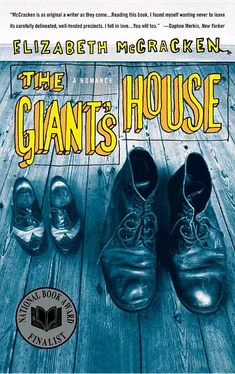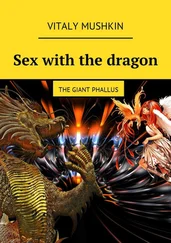James looked trussed as a turkey in his hospital bed. Actually, it was two beds, laid end to end, at a funny angle to the wall so they would fit. His broken leg was suspended from the ceiling.
“James,” I said. I couldn’t tell whether he was awake, and all of a sudden I realized I hadn’t brought him anything. Not even library books, which would have cost me nothing.
“Yes?” He reached over to a chair by his head, found his glasses, and put them on. He’d outgrown even these; the wire earpieces stretched out from the edges of the lenses to embrace his ears.
“Oh,” he said. “Miss Cort. How did you get here?”
“By bus,” I said.
“That must have been nice. I thought you were a nurse.” He gestured at me. “You’re dressed in light colors. That’s all I can see without—” He tapped one lens of his glasses; it flashed with the overhead light.
“How’s the old leg?” I asked.
He said, “Broken.” He was wearing a strange sort of hospital gown. Looking a little closer, I saw that it was two or more regular gowns sewn together.
The wall above his bed was feathered with get-well cards. I was about to walk closer to see — I’d been standing just inside the room — when someone knocked on my shoulder as if I were a door.
I stepped aside. The man who’d knocked was fat, with a moustache that covered his mouth.
“Hello, hello,” he said. The moustache bobbed up and down.
“I have a visitor,” James told the man.
“Yes, I know. Very nice. The aunt?” he said to me.
“No. A friend.”
“Nice,” he said. “Jim’s told me all about you.”
“You don’t even know who she is yet!” James said.
The man bowed to me politely. “You are—” He tried to look as if he were racking his brain for my name, but I knew the look. Library patrons who pretended to know the title of a book so as not to seem stupid wore the same expression.
“Peggy Cort,” I said.
“Of course!” He nodded. “I’m Dr. Bosley.”
“We’re busy,” said James.
“Of course you are,” said the doctor. He sat down in the only chair in the room, right by James’s head. “I’m just here to see how you’re feeling.”
“Fine,” said James. “Go away.”
The man nodded, still sitting.
“Dr. Bosley is a psychologist,” said James. “He always wants to know how I’m feeling. He never believes me.”
Dr. Bosley laughed in a way he probably thought was jovial. “I believe you,” he said. “Of course I believe you. Okay, okay. I’ll see you later, Jim—” He stood up from the chair with a great effort. “And it was nice to meet you, friend.”
“That man,” I said when he’d left, “does not have enough friends.” I went over and sat in the chair.
“I have to talk to him every day,” said James. “I mean, I like visitors, but he drives me crazy.”
James’s lack of affection for the doctor pleased me; I liked to think, sometimes, that I was his only friend, though this wasn’t true. I turned in the chair and looked at the cards. Most of them were from teenagers, kids in his classes.
“Who’s come to see you?” I asked. Until that moment I seemed to have forgotten the enormous fact that Mrs. Sweatt was dead. I felt dread drop down through my body, from my forehead to my stomach.
“Uncle Oscar. A teacher drove up some kids from school. If I’m here long enough, Uncle Oscar says they’ll bring the baby after it’s born.”
“How do you feel?” I asked.
“Lousy,” he said. “I’m sorry. I mean, I shouldn’t complain, but I feel lousy.”
“Leg hurt?”
“No.” He rubbed his hand on the metal at the side of the first bed. “That’s the problem. I don’t feel anything in my legs at all. I didn’t even know I broke it at first, I tried to walk on it.”
He was moving out of that body in steps.
Then suddenly he looked at me, directly in the eyes. This was new. Usually, like his mother, he concentrated on some other part of a face, perhaps because faces were frequently so far downhill.
“I hate it here,” he said.
“I know you do.” I tried to keep his gaze, and for a moment I thought I couldn’t possibly, that looking straight into his eyes was a weight I could carry only for seconds without resting. Then I realized all I had to do was do it, and it was easy. “How long will you be here?” I asked.
“I don’t know, they won’t tell me. They’re going to give me braces,” he said. “They’re going to give me a cane.”
“Until your leg heals?”
“Forever,” he said. “I want to go to college.”
I nodded.
“I want to be a lawyer,” he said. “I want to leave Massachusetts. I mean, just once.”
“You will,” I said. “You’ll go to New York, for that shoe convention.”
“How?” Now he looked up at the ceiling.
“What do you mean, how?”
“Car? Don’t fit. Bus? Less room. They had to take me all the way here from Hyannis in an ambulance, and even then it was crowded. Forget about airplanes.” He closed his eyes, clenched his jaw. “It’s been ages since I’ve been in a car. I stopped getting in them because I thought, well, they’re not all that comfortable. But I was just thinking: even if I tried now, no way for me to fit. It’s like I outgrew cars without even noticing.”
“That can’t be true,” I said.
“It is true. When you guys went to Provincetown for ice cream, don’t you think I wanted to go? I couldn’t cram myself into the Chevy for that long.”
“We’ll find a car for you,” I said.
“I’m outgrowing everything. I’m outgrowing my house. I can’t go anywhere by myself.”
“James.” What would I say to him? “We’ll figure things out.”
“I know,” he answered, though by his voice it was clear he knew no such thing.
The psychologist stopped me as I left James’s room.
“Where’s the mother?” he asked.
“I’m not sure,” I said. “You should ask Mr. or Mrs. Strickland.”
“I’ve asked Mr. Strickland. He’s vague. Is she in the state? Her son would like to see her.”
“He’s told you that?”
“Jim is a complicated young man,” he said.
I rubbed my forehead. “I don’t think she’ll be able to come see him.”
“I see,” said the psychologist. “You folks are an odd family. Well, if she’s available”—he said this in a way that made me sure he knew the truth—“she should come. And if she can’t, Jim should know that too. He is understandably a little blue over his state.”
“Blue?” I said. “That’s your professional opinion?”
“Understandably blue,” he repeated. “With all that’s happened to him, and will happen.”
“What will happen to him?” I asked.
Dr. Bosley blinked, then smiled shyly. “He’ll die,” he said.
“What?” I’d only wondered about the cane, the braces.
“Amazing he’s lived this long, in some ways. I mean, not that he’s about to die — the leg is healing pretty well, he’ll be up and about — but in the next few years, chances are.”
“Of what?”
“Of himself,” said the doctor. “The family knows it, Jim knows it. Sorry. Thought you did too. Giants don’t live long. The good Lord knew what He was doing when He constructed the human body; when something goes wrong, well — basically, there’s such a thing as being the right size.”
This was all news to me. They all knew, and nobody had told me, and I hadn’t done my research. I could have gone to a medical library, found articles. Everybody knew.
“Nothing to be done?” I said.
“Some things. Make his life easier. Get a car and take out the passenger’s seat, and he can ride in the back — a pretty big car will give him some space. Think about an addition to the house built to his scale. He’s likely to fall again, navigating small spaces. He needs as much room as possible, an environment that is more to his proportions.”
Читать дальше












